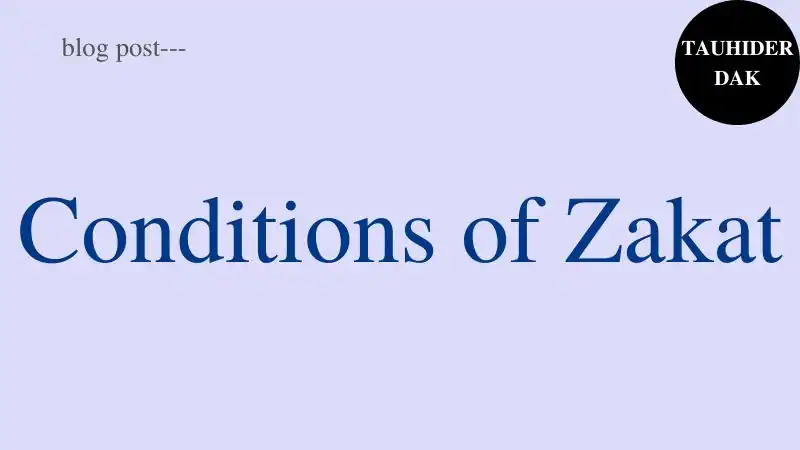conditions of zakat, what are the conditions of Zakat to be obligatory, how many and what are the conditions for Zakat to be obligatory

What are the conditions of Zakat to be obligatory?
Bismillah Rahmanir Rahim, there are four conditions for Zakat to be obligatory. It is discussed below:-
1st Condition: Individual to be independent
For Zakat to be wajib a person must be independent. Zakat is not obligatory on any slave. Because a slave cannot own wealth. In the hadith, it was narrated from Abu Huraira (RA), that the Messenger of Allah (PBUH) said, “There is no Zakat (Zakat) on a slave except Zakat al-Fitr.”
Elsewhere the Prophet (PBUH) said:
If one sells a slave and has wealth, that wealth belongs to the seller. But if the buyer stipulates it will be his (buyer’s). Bukhari Ha/2379, Banganubad Bukhari (Tawheed Publications) 2/564 p.
Therefore, since the slave is not the owner of wealth, Zakat is not obligatory on him. Similarly, Zakat is not wajib on a fakir.
2nd Condition: The person must be a Muslim
A person must be a Muslim for Zakat to be obligatory. Zakat is not obligatory on any disbeliever. Because Zakat is purifying. Allah says:
Shadaqwa will take from their wealth. By this, you will purify and purify them. (Repentance 9/103).
On the other hand, the infidels are outwardly pure but their hearts are impure due to shirk and kufr. Even if they give the world full of gold, they cannot become pure. Zakat is also one of the acts of worship in Islam. And no worship of the disbelievers is acceptable to Allah. he said
I will look upon their (disbelievers’) deeds, then reduce them to scattered dust’ (Furqan 25/23).
It should be noted that it is not necessary for a person to be an adult and conscientious for zakat to be obligatory. This is the pure opinion of the scholars. Therefore, Zakat is obligatory on the wealth of minors and the insane. Guardians will extract Zakat from their wealth. [Ash-Sharhul Mumti: (6/202-3)]
3rd condition: Assets must be Nisaab amount
The specified amount of wealth is called Nisab by Shari’ah. Zakat is obligatory on wealth if it exceeds a certain amount or more.
4th Condition: Completion of one lunar year with Nisab amount of wealth
The Prophet (peace be upon him) said:
“There is no zakat on any wealth until a year is completed on it.”
Sahihul Jame: Hadith No. 7497.
The Hijri year or lunar year will start counting from the day on which the wealth reaches the Nisab amount, provided that the Nisab amount of wealth remains constant or increases gradually until the end of the year. If in the middle of the year, the wealth decreases from Nisab, and then again becomes Nisab in the same year, then the year starts from the second time when the wealth reaches Nisab, the first date is not acceptable, because the year ends due to the decrease of wealth from Nisab. gone This is the madhhab of most scholars.
However, there are some assets, which do not need to complete a year for Zakat to be wajib. For example, fruits and crops are produced from the land.
Because zakat is obligatory on the day the fruits and crops are harvested from the land. Allah Ta’ala says:
“And give the right of it (i.e. fruits and crops) on the day it is harvested”. [Surah Al-An’am, Verse: 141]
Zakat on the offspring of similar livestock, i.e. if an animal gives birth to a calf between the Hijri years, that calf will be added to the Nisab. Profits on similar business goods, i.e. profits earned in the middle of the year will be added to the capital, even if a year is not completed on the profits. Similar treasure, it is not necessary to complete one Hijri year on it.
What are the conditions of Zakat to be obligatory?
conditions of zakat, what are the conditions of Zakat to be obligatory, how many and what are the conditions for Zakat to be obligatory
Importance of Zakat in Islam and punishment for not paying Zakat
